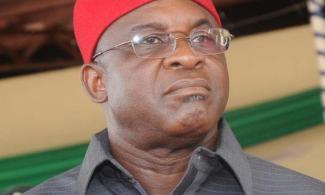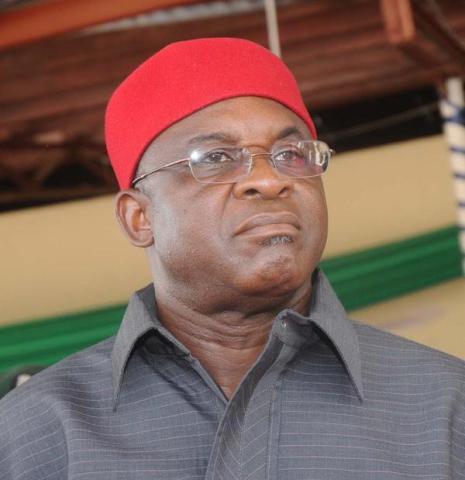
SaharaReporters recently published the telephone directory of members of the National Assembly and Nigerian state governors. The significance of the exposure of those numbers is lost on many. But it represents one of the disruptive events in Nigerian history.
Naturally, they did not volunteer their numbers. They are not believers in the concept of governance as the intercourse of the street and power. They are subscribed to a cult system that preys on the uninitiated. The avant-garde snoopers in New York made technology happen to them!
This breach of their elitist quarantine, more than anything they may have ever seen, would likely teach them that this information age brooks no colony of snobbery.
My profound joy at the development, nonetheless, I perceived that I had no motivation to save the numbers. I had reflexively calculated that these insecure, out-of-touch men would be more inclined to change their numbers than stoop to adapt to a new normal of conversing with minimum wage-earning commoners.

But for some inexplicable reason, I lingered on the numbers. I scanned them as if they were curious algorithms. I studied their makeup and the combination of the digits. It was getting close to becoming an indulgence in leisure when a certain name leaped out of the page:
SENATOR DAVID MARK!
David Mark, the immediate past senate president of Nigeria, the incumbent senator from Benue South, precisely the foremost vegetating but overpaid member of the Nigerian parliament, is the only constant leitmotif in this democratic dispensation. He is the face of a political class that is utterly selfish, irredeemably corrupt, and insatiably voracious.
As I focused on his name, I realized that I wasn’t supposed to see David Mark’s phone number. Because I wasn’t supposed to need it. Because I wasn’t supposed to own a telephone. Because David Mark had ruled that telephones were status symbols.
David Mark, the Minister of Communication, the man whose duty it was to expand access to telephony and stimulate the growth of Nigeria-rooted telecommunication enterprises, decreed with conclusive authority that being poor and owning a telephone was mutually exclusive.
It was Mark’s present to a Nigeria whose telephone density was unaccountably lower than that of its smaller and poorer neighboring countries!
As I focused still on his contact, it occurred to me that if this was David Mark’s world, or if, in 2016, telephone access was still within his purview, there probably won’t be 216 million connected telephone lines in Nigeria today. The enterprises spinning-off from the GSM revolution may exist only in the realm of possibilities. And countless Nigerians employed in the telecommunications sector would be jobless or prisoners.
If Mark was still the proverbial custodian of the yam and the knife, the odds are that Mark would have fed the rich and left ‘the poor’ to starve. He would have worked to keep the circulation of telephones within his circle of the affluent. He would have endeavored to foreclose the democratization of telephones in Nigeria.
Mark’s idea of a healthy social order is one in which class apartheid prevails, one in which the state treats a certain demographic as subhuman, one in which the poor live off the refuse dump at the backyard of the rich.
It’s a shame that Mark didn’t make the most of his opportunity as Minister of Communications. He interpreted his job as an obligation to communicate the sanctity of the privilege of the rich. He applied himself to keeping telephones out of the reach of ‘’the poor.’’
The charitable would be tempted to discount ‘’Telephones are not for the poor’’, the succinct paraphrase of his policy speech as a gaffe, a spur of the moment outburst that is not necessarily a measure of his worldview. But the quote is only one of the legacies of a man who is incapable of hiding his contempt for other human beings below his station in life.
While he was still minister, some civil servants in his Ministry complained that they had not been promoted for eleven years. They murmured to his hearing so he could create some movement in their crippled careers. Mark wasn’t happy to be asked.
He rebuked the civil servants for dreaming upward mobility. He told them they deserved the stagnation. They had yet to earn the promotion. They weren’t adding value. He ‘communicated’ that he had just had a brainwave: He would recommend the retirement of all stagnated folks!
This was said by a man who was so slothful the most he could make out of his job was a queer campaign for the Nigerian state to adopt death penalty as the due judgment of cable thieves!
David Mark entered politics in 1999. He intuited that there was no better platform available for him to continue his attack on ‘‘the poor.’’
He is the longest ‘serving’ member of the Nigerian senate. His longevity is a result of his magical ability to overtake the seemingly insurmountable lead of his popular rival –on election night!
Mark is often lauded for ‘stabilizing’ the senate during the eight years he functioned as the senate president. He is said to have stopped the rash of impeachments that preceded his ascendance because he was a consensus builder, a Solomon-grade wise leader.
David Mark was not any of that. What he really deserves credit for is his transformation of bribery into a philosopher’s stone. He discerned the price of every senator and overpaid them!
The senate presidents before him could not afford the rites of appeasement the senators demanded. They were high maintenance gods. But when Mark came on, he worked out the formula of the mix of allowances, ‘constituency projects’, and ‘juicy’ senate committee chairmanships that the greedy senators needed to forswear rebellion against him.
Mark’s constituents are the worst sufferers of the anti-poor creed he espoused in the 80’s.
In the 16 years he has ‘represented’ his people, half of which he spent as the third most powerful man in Nigeria, Mark did negligibly little to facilitate the construction of federal roads that run through Benue.
If he had helped build sufficient highways, he would have made himself liable to the humiliation of sharing them with the poor. Hence, he devised a way of avoiding the poor and the potholes. He built himself …a helipad in his Otukpo countryhome!
Mark expanded his anti-poor crusade to encompass farmlands. He also believed that farmlands are not for the poor. That’s why he attempted to rob the peasants of their estates in broad daylight.
He sent his surrogates to inform the farmers that he wanted to build his private university on their plots. Then, he moved in the bulldozers to destroy their crops. When the poor folks protested the takeover of their farmlands even before they had even consented to sell him their plots, he had six of them shot dead!
It was a bloody coup!
Mark would later show up in Agatu to cry against the genocide herdsmen visited on ‘’my people’’. The homeboy conveniently forgot that he was the forerunner of the terrorists. He, David Mark, committed the first genocide against his people!
His protégé, ‘Comrade’ Abba Moro, scammed 6.5 million Nigerian job seekers over 4000 putative vacancies in the Nigerian Immigration Service. Moro extorted the applicants in the name of ‘application fee’, packed them in football stadiums across the country, and provoked stampedes that claimed twenty lives.
Following global outrage, Mark’s senate mandated the Committee on Interior to investigate the tragedy and report in two weeks. The members organized public hearings, wrote the report, and submitted it. Mark refused that it be listed on the order paper. The report predictably indicted his lackey. He shredded the ‘negative’ report!
Mark believed that justice –like jobs and farmlands and roads and telephones–are not for the poor!
Upon the annulment of his election, Mark hired Abba Moro as the Director General of his senatorial campaign. The two had between them a record of twenty six murders. They ‘won’ in spite of that. They bought the votes of the poor with cups of rice and sachets of table salt!
Panama Papers revealed the identity of prominent figures with savings in offshore tax havens. Those named reacted according to the moral universe they lived in.
The Prime Minister of Iceland, Sigmundur David Gunnlaugsson, resigned. The Prime Minister of Britain, David Cameron, apologized for profiting from the ‘sin’ of his late father.
Mark, the ‘David’ who lives in Nigeria, the ‘David’ in whom Nigeria lives, swore that the papers were a fabrication. He claimed that he was poor abroad!
Since his denial, copies of his correspondence with his collaborators in British Virgin Islands have surfaced. They buttress the fact that Mark maintained offshore bank accounts and ran eight shell companies as senate president. They are violations of the code of conduct established for Nigerian public servants.
Obviously, David Mark laundered parts of his dirty money through the wire. This means that the rich poor is...a cable thief.
He is eligible for death penalty -the reward he had proposed for hustling ‘’cable thieves.’’
You can write to me at [email protected] or follow me on Twitter @EmmaUgwuTheMan